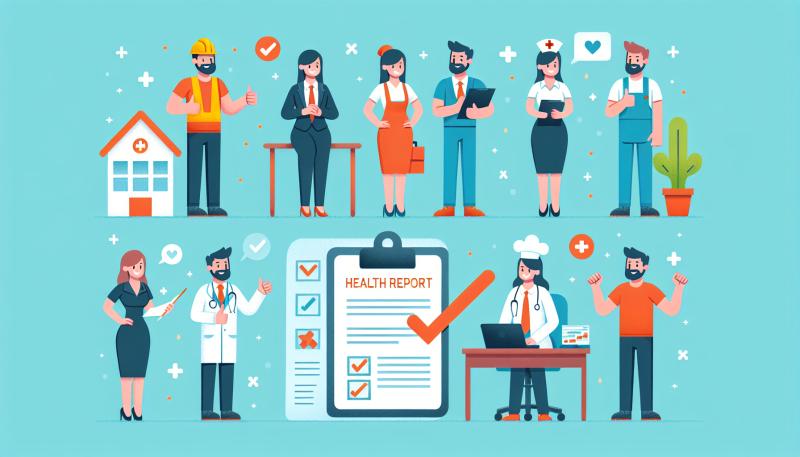
The Benefits of Regular Occupational Health Screenings
In today’s fast-paced and ever-evolving work environment, the well-being of individuals is more important than ever. As we continue to understand the impact of various health factors on productivity and efficiency, occupational health screenings have become essential tools in promoting a healthier workforce. Regular occupational health screenings not only ensure the well-being of employees but also bring numerous benefits to individuals who prioritize their health. Through this exploration, we will delve into the advantages of these screenings and highlight why it is advantageous for individuals to engage in these health assessments.
Understanding Occupational Health Screenings
Occupational health screenings are comprehensive evaluations specifically designed to assess the health and fitness of individuals in relation to their work environment. These screenings can include a broad range of tests and assessments, such as vision and hearing tests, respiratory assessments, cardiovascular evaluations, and various other health checks. The purpose is to ensure that individuals are capable of performing their work safely and effectively while identifying any underlying health issues that may require attention.
Key Benefits for Individuals
1. Early Detection of Health Issues
One of the most significant advantages of regular occupational health screenings is the early detection of health issues. Many health conditions, such as hypertension and diabetes, may not present obvious symptoms in their early stages. Screenings provide an opportunity for these issues to be identified before they become more severe, allowing for timely intervention and management, which can prevent complications and improve overall health outcomes.
2. Improved Quality of Life
By participating in regular health screenings, individuals gain insight into their health status, which can lead to lifestyle adjustments that promote a better quality of life. Whether it’s adopting a more balanced diet, engaging in regular physical activity, or managing stress more effectively, the information obtained from screenings can empower individuals to make informed decisions about their health and well-being.
3. Increased Work Productivity
For many, health has a direct impact on productivity. By identifying and addressing health issues through screenings, individuals can improve their physical and mental capacities, leading to enhanced job performance and increased productivity. Healthy employees are more engaged, motivated, and capable of focusing on their tasks, contributing to a more efficient and successful work environment.
4. Enhanced Safety in the Workplace
Occupational health screenings are crucial in maintaining a safe working environment. When potential health risks are identified early, preventative measures can be put in place to reduce the likelihood of workplace accidents and injuries. This not only protects the individual but also promotes a culture of safety and care within the workplace.
5. Personal Health Management
Regular screenings encourage individuals to take charge of their health. Understanding personal health metrics such as cholesterol levels, blood pressure, and body mass index (BMI) enables individuals to track changes and respond accordingly. This can lead to the adoption of healthier habits and proactive health management, ultimately fostering long-term wellness.
The Role of IMS Screening Solutions
When considering the implementation of regular occupational health screenings, it is essential to choose a reliable provider that offers comprehensive assessments and personalized support. IMS Screening Solutions is a trusted name in the industry, committed to delivering exceptional occupational health services that meet the unique needs of individuals and organizations alike. Their expert team is equipped with the knowledge and tools necessary to conduct thorough screenings, ensuring the highest standards of care.
- Professional and experienced staff
- Comprehensive array of health assessments
- Customizable screening packages
- State-of-the-art facilities
- Commitment to promoting health and safety
For more information on how IMS Screening Solutions can assist you in your journey toward better health, visit their website at https://www.imsscreenings.com.
How to Make the Most of Health Screenings
- Be Informed: Before your screening appointment, educate yourself on the tests you will undergo and their significance. Understanding what each test entails can help alleviate anxiety and prepare you for any outcomes.
- Communicate Openly: It’s important to be honest and open with healthcare providers. Discuss your medical history, any symptoms you may be experiencing, and any concerns you have. This insight can assist healthcare professionals in providing the best possible care.
- Follow Up: After receiving your screening results, ensure you engage in any recommended follow-up actions or treatments. This may include scheduling additional tests, making lifestyle changes, or beginning a new medication regime if needed.
- Stay Proactive: Stay proactive about your health by maintaining regular screenings as part of your routine healthcare regimen. Consistency is key to preventing health issues and ensuring optimal well-being.
Conclusion
Regular occupational health screenings provide substantial benefits for individual consumers, contributing to the early detection and prevention of health issues, improving productivity, enhancing the quality of life, and fostering a safer work environment. As individuals take charge of their health, the partnership with trusted providers like IMS Screening Solutions becomes invaluable, offering tailored services that cater to personal and occupational health needs.
In conclusion, investing time and resources in regular occupational health screenings is a wise choice for anyone seeking to prioritize their health and well-being. By recognizing the importance and advantages of these screenings, individuals can take proactive steps towards a healthier, more productive life both inside and outside of the workplace.
